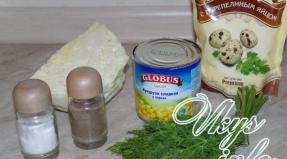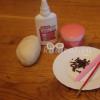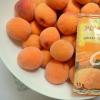How to identify bad eggs. How to tell a fresh egg from an old or rotten egg
Every week you bring home huge bags of a wide variety of products from the markets and supermarkets. On the one hand, this makes your life much easier, and on the other, it complicates it, because not everyone can constantly keep in mind the expiration date of all this gastronomic variety. Remember how often you opened the refrigerator door and wondered, "How long have these products been here?" We are sure that this problem is familiar to many firsthand. This is especially true for eggs. Although it is a very delicate product, it appearance does not change over time, and therefore "by eye" to determine the freshness of an egg is almost impossible. Of course, it's no secret to anyone that you can break an egg and try to smell freshness, but there are other ways. Here are some ways to check the freshness of your eggs:
1. Submerge eggs in water
Place the eggs in a deep bowl of cold water. If they are left lying on the bottom in a horizontal position, then they are very fresh. Eggs, slightly raised at an obtuse angle upward, are not the first freshness, but they can still be used in cooking hot dishes. Eggs that float to the surface are spoiled and cannot be eaten! We recommend that you get rid of them as soon as possible.

The eggs float to the surface because over time the moisture inside evaporates through the shell and the resulting "free" space is replaced by air. The more air inside the egg, the higher it floats. And, of course, the older it is.
2. Check the white and yolk
Break one of the eggs and notice the condition of the yolk and white. If the yolk is bulging, and the white is viscous and tightly assembled around the yolk, the egg is very fresh. However, if the yolk is flat and the white is runny, this is a sign of a stale egg

Cause: over time, the protein chains (different substances associated with each other) disintegrate, in this regard, in the old egg, the yolk and white are loosely linked together.
3. Shake the egg
If, when shaking, you do not hear extraneous sounds, then you can safely eat the egg - it is fresh. If, at the same time, splashes or squelching are heard, it means that air has entered the egg and expanded the natural air bubble. You can't eat such an egg anymore.
4. Pay attention to the expiration date

On the packaging of eggs there is always information about the expiration date, which should be paid close attention to. The supplier guarantees that the product will remain fresh if stored properly. Eggs can generally be eaten for some time after the expiration date, but it is strongly recommended that you test them for freshness using the methods described above before doing so.
When eating eggs, special attention must be paid to hygiene. Pay attention to the following guidelines:
- Buy only fresh eggs and use them before the expiration date.
- Store eggs in the refrigerator - Salmonella bacteria will not multiply at temperatures below 6 ° C. At room temperature, their number increases. Please note that subsequent cooling will not save the situation.
- When preparing meals using raw eggs, use only very fresh eggs.
- Boil the eggs for at least 5 minutes in boiling water.
- If the eggs have expired, then for some time they can still be eaten, but only if thoroughly cooked. Salmonella bacteria are killed at 70 ° C.
- If the shell of the egg is damaged, then it must be cooked immediately. It is no longer possible to store such a product.
Where is the best place to store eggs in a Liebherr refrigerator?
Eggs can be stored in the refrigerator for up to 15 days. In the freshness zone
Any housewife would like to buy exclusively fresh eggs, as they have the best taste and culinary properties. At the same time, spoiled eggs can not only interfere with the preparation of the planned dish, but also harm your health. How do you know if an egg is fresh before a spoiled product harms the body? If you don't have an ovoscope in your arsenal, which allows you to illuminate the egg for the smallest defects, you will have to use the means at hand. So how do you check the freshness of eggs in a store?
- By the look. A fresh egg has a matte, rough, flawless shell, while a stale egg has a glossy surface.
- Aurally. Shake the egg near your ear: a fresh egg will not make any sound, while a gurgle will be heard in the bowels of an old egg.
- Tastes. There is a rather exotic way to check the freshness of an egg - to measure its temperature with your tongue. If you alternately touch the sharp and blunt end of the egg, you will feel that the temperature is higher at the blunt end - this means that the egg is fresh. If the temperature is the same at both ends, then this is an old egg. However, it is not recommended to use this method right in the store, at least, you can be mistaken for a madman, and as a maximum - catch some kind of disease.
- If the egg is fresh, it will sink to the bottom and lie horizontally.
- If the egg is from a week to two, its blunt end rises upward at a 45-degree slope.
- If the egg is standing upright, it means that it is more than two weeks old, and it is advisable to use it only as an additional ingredient.
- If the blunt end of the egg is above the surface, this is a bad egg, put it back and do not touch it again. He is more than a month old, and it is categorically not recommended to eat such a product.
Another way to test the freshness of chicken eggs is to enlighten them. In a fresh egg, all the insides are clearly visible, while in the old one spots are visible, and a rotten one is not visible at all.
The initial check has paid off and we are now breaking a raw egg. You see, a fresh egg has two levels of protein: thick in the yolk and more watery around the thick. This is a fresh egg. If the protein is completely watery, and there is no faint film around the yolk, this is an old egg.
If you do not have the opportunity to check the freshness of the eggs yourself, you will have to trust the manufacturer. Eggs are divided into two categories: dietary and table eggs. Diet eggs are always marked with a red stamp with the date of manufacture and grade. An egg is considered a dietary one when it was made no more than seven days ago from the date of purchase, then eggs are transferred to the "table" category.
Table eggs have a blue stamp indicating the category, no date of manufacture. The designations “O”, “1”, “2” mean, respectively, “selected” (the largest), “1 category” (slightly less) and “2 categories” (the smallest). Table eggs can be stored for up to 30 days in the refrigerator, and the ideal temperature for eggs is +5 +8 degrees.
- It is not recommended to store eggs next to strong-smelling foods: eggshells can absorb odors.
- Eggs should be washed thoroughly before use, especially if there are residues of droppings, feathers or blood on the shell.
- It is better to store eggs with the sharp end down.
The maximum benefits of eggs can be said only if they are fresh. After spending a month in the refrigerator, they lose their nutritional value and become hazardous to health. Once in the body, an expired product causes serious intoxication, which can be fatal. Therefore, it is important to be able to independently determine the degree of freshness of such a product and understand the permissible terms of its suitability. Further in the article, we will tell you in detail what to look for when buying chicken and quail eggs, how long they can be stored and where it is better to do it.
How to tell if an egg is fresh: chicken and quail
The unique structure of the eggshell allows the inner part to retain its beneficial properties for a long time. But for this, certain storage conditions are important. Otherwise, the inside of the product will begin to dry out, and a foul-smelling chatterbox unsuitable for further use will form. 
There are many ways to check the freshness of an egg at home. And for this it is not at all necessary to drag a microscope and the rarest chemical reagents into the kitchen. You can even judge the suitability of these products in the store. Let's go into the details.
Did you know? The People's Republic of China is the largest egg producer in the world today. About 160 million pieces of this product are produced there annually. Many experts attribute this to the fact that chicken first appeared in this country. And it happened somewhere in 1400 BC.
At the time of buying
Experts advise against making blind purchases. In their opinion, the visual assessment of the product is important. Therefore, going to the supermarket or the market for eggs, examine them carefully... Recently demolished specimens will be favorably distinguished by a matte shell surface. But those that have already lain for several days will be characterized by a specific glossy shine. But it is not worth focusing only on this verification method. Experts warn that savvy sellers resort to various tricks in order to successfully sell products. One of these is rubbing or washing each piece.  So that the purchase does not disappoint with an unpleasant smelling substance, when choosing an egg tray, compare it with the rest of the assortment... Ideally, the whole ten should have shells of the same color and gloss. If you have a diverse set in front of you, most likely the seller mixed in old and fresh eggs. Smell them. A strong unpleasant odor will be heard in heavily expired boxes.
So that the purchase does not disappoint with an unpleasant smelling substance, when choosing an egg tray, compare it with the rest of the assortment... Ideally, the whole ten should have shells of the same color and gloss. If you have a diverse set in front of you, most likely the seller mixed in old and fresh eggs. Smell them. A strong unpleasant odor will be heard in heavily expired boxes.
Important! The shell of a fresh egg has a specific smell that is very similar to lime.
Shake up a raw egg as well. If you hear a distinct chatter inside, you should refuse to buy. After all, talkers are not fit for use.
Do not ignore what is stated on the product expiration date... By informing you about this, the manufacturer guarantees the freshness of the product, provided it is stored correctly. Always choose fresh produce and try to use it before the expiration date on the packaging. 
When cooking
Many consumers are not serious about stamps on egg trays and continue to eat expired items. According to experts, in reality, it retains its usefulness for a short time. But before use, its freshness must be double-checked.
This is done in the following ways:

Important! Eggs are a source of salmonellosis, so boil them for at least 5 minutes in boiling water. Keep in mind that Salmonella bacteria lose their viability at temperatures of + 70 ° C.
Video: checking an egg for freshness with water
At autopsy
Break the shell and visually assess the condition of the inside. In recently removed specimens, the protein will be viscous and tightly assembled, and the yolk will be convex. If the testicle has been lying for a long time, then you will see a liquid spreading white and a flat yolk. 
What is the danger
A stereotype about the exceptional benefits of chicken and quail eggs has clearly taken root in society. But if the rules for their storage were violated, then there is no need to talk about the nutritional value of this protein food and the saturation of the body with vital substances. In this case, as evidenced by medical statistics, we will talk about poisoning and its consequences.
In addition, improper cooking of eggs, the use of dirty dishes, as well as infected kitchen utensils threatens the development salmonellosis... The bacteria that provoke this disease live in the egg white, yolk and on the shell. Their source is the laying hen. Moreover, even experts will not be able to recognize the infected specimens by external signs. Neither the color of the shell, nor the smell, nor other visual features of the product will give this away.
Did you know? The Chinese dye their eggs red every time a newborn is born in the family. According to folk legends, such a ritual guarantees the baby a long and happy life..
When eating expired or contaminated eggs are dangerous to health: homemade mayonnaise, raw sugar and egg mixture (protein or yolk), as well as all dishes that have not been sufficiently heat-treated. This can be fried eggs, poached eggs, and even traditional fried eggs. Therefore, doctors strongly recommend strictly monitoring the shelf life of such products and cooking them at high temperatures.  Signs of egg intoxication become apparent during the first days after eating poor-quality food.
Signs of egg intoxication become apparent during the first days after eating poor-quality food.
The eater is observed:
- vomit;
- nausea,
- weakness;
- painful sensations in the abdomen;
- developing against the background of the disease gastroenteritis (when inflammation of the mucous membranes of the small intestine occurs);
- diarrhea (as a rule, the stool is very liquid, resembles rice water in consistency and is characterized by a dark green or yellow color);
- an increase in body temperature up to 39-40 °;
- bloating;
- signs of colitis resulting from inflammatory processes in the large intestine;
- cramping;
- decreased appetite;
- violation of the functionality of the central nervous system (manifests itself in severe poisoning and is expressed by headaches, dizziness, insomnia, lethargy);
- malfunctions of the cardiovascular system (pressure decreases, heart rate and heart rate change);
- bacterial infection and sepsis (with such symptoms, the outcome is fatal).
Important! To extend the shelf life of eggs at home, grease their shells with pork fat, vegetable oil or petroleum jelly and place in a cold room where the temperature is below +10 ° C. Alternatively, each piece can be wrapped in plain paper and folded with the sharp ends down, covered with burlap..
The manifestation of the listed symptoms largely depends on the victim's immunity. But for any degree of egg poisoning, it is important to protect the body from dehydration.  For this purpose, the following are recommended:
For this purpose, the following are recommended:
- solution of "Regidron" or "Oralita";
- any sorbents (activated carbon, "Smecta", "Polyphepan");
- immunomodulatory drugs (multivitamin complexes, "Methyluracil");
- antibiotics, which are prescribed by a doctor on an individual basis;
- limiting the use of dairy products, raw vegetables and smoked meats (it is advisable to provide the patient with a sparing diet during this period).
If, after a day, the disease continues to progress, it is necessary, without wasting time, to seek medical help.
Shelf life of eggs
How long chicken and quail eggs will be fresh depends largely on their origin and storage conditions:
- if we are talking about industrial production, then the shelf life of such products is limited to 28-30 days;
- but homemade products can retain their nutritional value for a quarter;
- if all the requirements for the temperature regime and the degree of humidity in the room have been met, then the fresh product will not deteriorate even after a month (this applies to the cellars and the refrigerator);
- boiled eggs are suitable for 2 weeks (provided that they are hard-boiled and stored in the refrigerator);
- when the boiled product is at room temperature, after 48 hours it can no longer be consumed;
- even in the refrigerator, soft-boiled eggs spoil after 2 days;
- under no circumstances are specimens with broken shells subject to long-term storage (it is recommended to use them on the same day);
- if the shell cracked during cooking, such a specimen can lie in the refrigerator for 4 days;
- in the case when you have prepared eggs, peeled from the shell for some purpose, they should be used 3 days after storage in the refrigerator;
- Easter dyes will not deteriorate for 15 days, provided that only natural dyes were used for them;
- but Easter eggs that were dyed with chemical reagents can be suitable for no more than 17 days;
- Easter copies in thermal film must be eaten within 3 days.







Did you know? If you hold an ordinary fresh egg for several days in 9% table vinegar, its shell will harden so much that it will not break even from a strong impact on the floor.
Where and how best to store eggs
For storing such products, most consumers prefer a compartment in the refrigerator door. But experts on this occasion express their indignation, which is associated with a sharp temperature drop. In such conditions, eggs quickly lose their nutritional value and do not represent any gastronomic value.
Experienced housewives advise choosing a place for this kind of product where it is always cold. In no case should you put the tray in the freezer.
In fridge
It is imperative that each piece be fixed in a stable position with the sharp end down. It is important that the eggs do not touch. It is better to leave them in a special stand or tray, laid out in the cells. Do not forget to close the container, because eggshells are very sensitive to neighboring odors. From the refrigerator, it will absorb everything nearby.  Make sure that the temperature in the chamber is at the level +2 ... + 4 ° С... Never wash the shell before storing it. Such manipulations shorten the shelf life.
Make sure that the temperature in the chamber is at the level +2 ... + 4 ° С... Never wash the shell before storing it. Such manipulations shorten the shelf life.
Sometimes even the most responsible housewife cannot remember how long chicken eggs have been in her refrigerator. A stale product can poison the whole family, so be sure to check the suitability before cooking. The problem of expired products can be not only in spontaneous markets, but also in supermarkets that have a well-known name.
Eggs contain vitamins, minerals, proteins, carbohydrates and fats, amino acids. They take pride of place not only in the adult, but also in the children's diet. In terms of importance, they can be put in second place after milk.
You should not start cooking until you are convinced of the excellent quality of the eggs. Do not forget that they can be demolished several weeks before they hit the shelves. How to determine if an egg is rotten or not?
- Why are they useful?
- How to check the quality?
- How to store?
- Reviews and comments
Why are they useful?
The protein of this product is completely absorbed by the human body. Better to eat them boiled or fried. But raw can be dangerous if there is an infection in them. They are rich in magnesium, phosphorus, potassium, iron, zinc and other beneficial elements.
They must be eaten by people who rarely go to the sun, because they contain a lot of vitamin D. It is simply indispensable for strengthening bones. Lecithin has a beneficial effect on the liver, brain activity, strengthens the walls of blood vessels. Lutein improves vision, and choline inhibits the development of cancer cells. Folic acid is essential if you are considering becoming a mom.
The shell contains more than 30 trace elements, approximately 2 grams of calcium. It is good to use it in combination with lemon juice. Crush the shells, stir and add to food by teaspoon.
But to get all these benefits, you only need to eat a good fresh quality product.
How to check the quality?
How to tell if an egg is rotten? Unfortunately, some unscrupulous consumers indicate the expiration date inaccurately. Therefore, the hostess must learn to determine the freshness of an egg "by eye". Then it will be possible to avoid indigestion and other serious diseases that are treated only in a hospital.
Rotten and fresh differ according to the following basic criteria:
- A three-day product does not have an unpleasant odor, unlike a spoiled one;

- If you shake a fresh egg, there will be no noise inside;
- The contents are rotten if they do not sink in a container of water;
- Unroll it - if it does not stop for a long time, it means that it has been lying for a long time.
The easiest way to recognize a rotten egg is to sniff. Stale has a characteristic odor that is difficult to confuse with any other. Another criterion is the yolk. He should not shake or knock on the walls. If you put it in the light, then the yolk should be clearly visible. On a flat surface, rotten will spin for a long time - this is another method that helps to determine freshness.
Many people know how to identify a rotten egg by placing it in water. This method is based on the laws of physics. Fill a glass with two-thirds of the water and place the egg in it. If it is "not older" 3 days, it will immediately drown in water. Eggs a week old will remain tilted, and rotten eggs will float to the surface.
This is because they are not airtight. Microorganisms can enter the pores that are present on the shell. If putrefactive processes have already begun, then gases will be released, which are raised to the surface.
Of course, these methods cannot always be used in a store. The quality of the product is influenced not only by the weight, but also by the time when it was demolished. Eggs that have not yet turned three days old are assigned the highest grade. A week-old product belongs to the first grade, and three weeks old - to the second.
How can you spot a rotten egg without breaking it?
Its surface should be monochromatic, without cracks and chips. If the shell has a grayish tint and there is no shine, then it is already stale.

There is another test method that can help a shopper in a supermarket determine the freshness of a product. It is necessary to use an ovoscope - a special device for transillumination. When the dark yolk is immediately visible, and it is closer to the shell or sticks to it, darkening is visible, then the product is "old". The spoiled ones are not visible at all. If you do not have a device, you can bring the product to a light source and make sure there are no dark spots under the shell.
When you break the egg, take a close look at the yolk. In fresh produce, it is tight and convex. If it is not the first freshness, then the yolk will be flat, and the white will be watery. Fresh is much more difficult to clean than old.
How to store?
Fresh they can be stored for quite a long time, but no more than six weeks. They must be placed in the refrigerator separately from other foods.

They absorb foreign odors very quickly. In addition, infections can enter through the pores if infected meat or fish lies nearby. To close the pores, brush the shells with vegetable oil.
They need to be folded with a sharp "nose" down. Then the yolk will not touch the air layer, and "settle" in the center. In this position, it can be stored in the refrigerator for up to five weeks. If the shell is cracked, they should be eaten as soon as possible.
It is not difficult to figure out how to identify a rotten egg when cooking. If it has already completely deteriorated, then the unpleasant smell will be felt immediately, as soon as you pick it up. A rotten egg will look different from normal when boiled. The protein will curl up and you will smell an unpleasant smell as it breaks. Although bacteria will die from high temperatures, you cannot eat it - poisoning is inevitable.
As you can see, every housewife can check the quality of an egg without violating the integrity of its shell. We wish you more fresh, tasty and healthy meals!
Eggs are a product that can be found in any refrigerator. Have you ever had such an experience that you are already boiling eggs and notice that they are spoiled? Or perhaps the packaging does not indicate the date until which the product should be consumed, is it possible to eat them at all or is it better to send them to the trash can? It is not difficult to identify a spoiled egg. In this article, we will tell you how to tell if an egg has gone bad and how to tell if it can be eaten. If eggs lie in your refrigerator for a very long time, you just need to determine if they are fresh in order to exclude deplorable situations.
How to check a rotten egg
What does expiry date mean? This is the period of time when the products are the freshest, most delicious, and recommended for cooking. It does not mean at all that after this period has passed, the eggs have deteriorated, they just are inferior in taste to those that are fresher.

The products are indicated by the manufacturer's code (letter and number).
In many countries it is customary to mark the packing time on the eggs themselves. Because they can be sold individually without packaging. The manufacturer is obliged to inform about the period of consumption.

In order for there to be no temperature difference, eggs should be in the coldest part of the refrigerator. The refrigerator door is categorically not suitable for this, because it is here that the temperature regime can fluctuate.
Do not put unwashed eggs on the table in the refrigerator. In many countries, it is accepted that eggs are in kitchen cabinets, they are not put in the refrigerator. Given that the chickens are given all the necessary vaccinations, nothing will happen to the eggs in the cabinets.

If you do not know if the eggs are fresh in your refrigerator, or there are such suspicions that they have been lying for more than 1.5 months, you need to know the signs of rotten eggs, with which you can easily determine whether these eggs can be used in cooking ...
How to identify a rotten egg

When a boiled egg has a greenish tint, it has been boiled for too long or the concentration of iron in the water is too high. It can be eaten.
If you find bloody spots in the egg, it can also be eaten, it is quite fresh. This does not in any way affect the taste of the egg itself.
How to recognize a rotten egg or not

Ideally, if the egg is of good quality, it should be in a glass on its side.
If the egg is in an upright position in water, it was packed relatively long ago, but nevertheless it is still suitable for cooking.
An egg that is not fresh enough will not sink. It can still be used in cooking. It needs to be broken into a bowl in order to determine if it is fresh, pay attention to the protein. Eliminate the fact that it is spoiled by smell. An egg not to be used has a pungent smell.

A fresh egg will not show any sounds.
When there are any sounds in an egg, this does not mean that it cannot be eaten, such an egg is quite fresh.

In an egg that is far from the first freshness, the yolk will burst very quickly.
If it floats on a squirrel, this is also an indicator that the egg is old and it is better not to use it in cooking.
Pay attention to the color of the protein itself. A grayish white means the egg is very fresh. A clear protein indicates that the egg is not very fresh, but you can eat it and this will not affect your health in any way.
- The yolk should always be round, if it is flat - such an egg should never be used.
- Do not store eggs with other ingredients, as they will absorb odors in a very short period of time.
- If the egg is cracked, it should be consumed in a short period of time.
- Villagers extend the life of eggs by greasing them with sunflower oil.
Be careful:
It is not recommended for children and the elderly to consume eggs with an expired shelf life. You do not need to rely on the fact that eggs can be eaten for some time after the expiration of the period of use, you must definitely know how to check eggs. Be careful not to harm yourself or your loved ones. Always pay attention to the date of manufacture.
Read also ...
- Chicken liver pate
- Delicious zucchini with cheese in sour cream in the oven - a step by step recipe with video Zucchini recipes in the oven with sour cream
- Banana rice and corn flour pancakes (gluten free) with homemade banana sauce Banana pancakes with semolina
- Cabbage casserole with chicken Chicken fillet casserole with cabbage



















